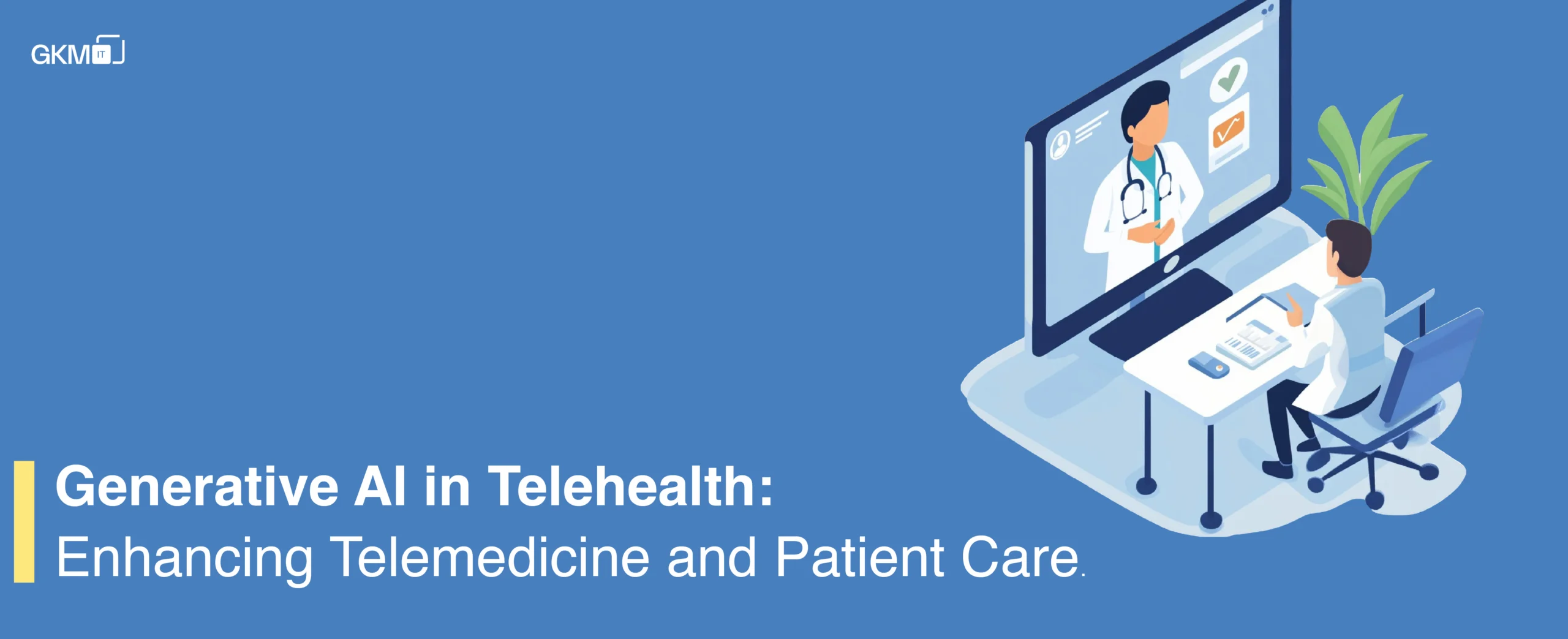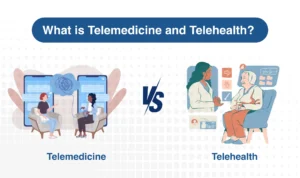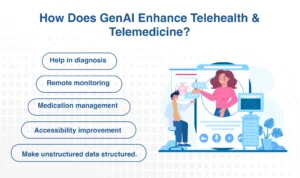
Generative AI in Telehealth: Enhancing Telemedicine and Patient Care
Generative AI has impacted the growing global data-driven market in recent years, automating daily operations in unprecedented ways.
GenAI can augment telehealth/telemedicine by improving and automating diverse procedures such as documentation, appointment scheduling, remote monitoring, and virtual consultation for efficient patient care.
In a world where telehealth is becoming the norm, could generative AI ensure that every virtual appointment is as comprehensive and effective as an in-person visit? What would a future with AI-enabled health and telemedicine look like?
Let us explore this in detail:
What is Telemedicine and Telehealth?

Telehealth and telemedicine both utilize telecommunication strategies to offer healthcare remotely. Telehealth includes telemedicine and other remote healthcare services such as offering training, administrative meetings, and education.
It also includes services offered by pharmacists, nurses, and social workers. Telehealth offers more services than just physician-patient consultation.
Telemedicine, on the other hand, is a specific kind of telehealth that includes remote clinical services such as treatment, diagnosis, and monitoring of patient health progress.
How Does GenAI Enhance Telehealth and Telemedicine?

According to the report by McKinsey, GenAI can assist in unlocking a significant portion of the $ 1 trillion enhancement potential in the healthcare industry, showcasing its future role in healthcare. Below are the ways GenAI enhances telehealth and telemedicine:
Make unstructured data structured.
AI in telehealth plays an important role in automating many tasks related to managing unstructured data; this decreases manual interventions and enhances operational efficiency. AI can efficiently flag and sort documents, determine duplicate data, and extract key insights from unstructured sources.
Help in diagnosis
AI in telehealth utilizes efficient algorithms that can examine patient data, medical images, and symptoms more quickly than human experts and other technologies. These AI capabilities can offer healthcare professionals in making more accurate and faster diagnosis.
Remote monitoring
AI-powered telehealth solutions such as chatbots, IoT, and wearable devices can track patient vital signs as well as other body functions. With these analyses, AI in telehealth can alert HCPs (Healthcare professionals)to potential issues and ensure timely medical response and treatment.
Medication management
It is challenging for healthcare providers to keep a record of the medication of many patients together, even for the most experienced HCPs. However, AI in telemedicine can play an important role in tracking medication adherence and flagging potential drug interactions.
Accessibility improvement
AI in telehealth can assist in providing healthcare services like real-time captioning and interpretation of sign language for patients with specific hearing impairments. This can assist in enhancing the accuracy of diagnosis and time, resulting in faster treatment.
AI Use-Cases of Telemedicine
Remote patient monitoring:
AI-powered remote patient monitoring is redefining healthcare by offering continuous surveillance of necessary signs such as blood pressure, heart rate as well as blood glucose level, enabling real-time insight into the healthcare provider during any emergency. In addition, AI telehealth solutions contribute towards efficient medication adherence, providing reminders to patients to take their medicine on time.
Virtual consultation and assistance:
AI is rapidly reshaping how healthcare is delivered and accessed in virtual consultation and assistance. Patients can easily interact with AI-powered chatbots as advanced algorithms utilized in AI offer precise support and assistance to patient queries. Further, chatbots assist in making things easier for patients to schedule appointments and determine general medical data. This will promote inclusivity with seamless and personalized care for diverse patient populations.
Virtual triage:
It is an important use case for AI telemedicine, where AI-powered telehealth algorithms assist in rapidly examining the symptoms and patient history to prioritize cases on the basis of urgency. This approach assists in the timely treatment of patients with critical conditions, streamlining the workflow of HCPs, resulting in decreased wait times, ultimately improving patient satisfaction and enhanced engagement with the enhancement of the overall quality of healthcare delivery. Virtual triage showcases the positive impact of AI in improving triage procedures, mainly in emergency situations.
Management of medication and treatment plans:
The power of GenAI is leveraged by medication management in telemedicine to personalize the medicine prescription and administration for remote patients. AI algorithms efficiently examine patient medical history, and necessary data such as lifestyle and current health metrics to to prescribe medications according to individual needs.
Diagnostic assistance:
AI offers a comprehensive suite of tools designed for telehealth software applications. AI-powered telehealth solutions excel at analyzing medical images such as MRIs, CT scans, and X-rays. This assists in elevating the accuracy of determining abnormalities, fractures, tumors, and diverse medical conditions. Implementing AI in telemedicine assists in redefining diagnostics procedures, ensuring accuracy in remote healthcare service delivery.
Rehabilitation:
Telehealth and artificial intelligence have shaped the recovery procedure with personalized care. AI can redesign individual exercise programs based on progress or patient recuperation from injuries and surgeries. By continuously examining patient data, AI offers valuable insights to healthcare providers and makes data structured. This information assists in making more informed decisions in treatment adjustments, directing to more efficient rehabilitation programs and improved patient outcomes.
What Does the Future Hold for AI in Telehealth/Telemedicine?
Telemedicine will become the core methodology of healthcare delivery in the future. This is where we are going to get the efficiencies we need to offer affordable care. AI in telemedicine is the natural evolution of healthcare. AI in telehealth: What do you think, comment below your perspective on the future of AI in telehealth and telemedicine.
Related Blogs:
HIPAA Compliant Hosting For A Web Application Questions To Ask
How To Prevent A HIPAA Data Breach
Smart Healthcare Through The Internet Of Things Benefits And Applications
The Key Differences Between Javascript And Python
Frequently Asked Questions
AI is essential in telehealth to automate diverse administrative tasks such as billing, patient records, coding, and scheduling. This reduces the burden of workload on healthcare providers by minimizing errors and improving operational efficiency. AI improves diagnostic accuracy, remote patient monitoring, examining medical images, and offering virtual triage and medical consulting services.
One of the main challenges faced in implementing AI in telemedicine is ensuring that algorithms are reliable and accurate. For efficient operation, robust training datasets and ongoing validation are required to ensure that the algorithms are performing accordingly. Furthermore, there are various challenges faced such as data security and privacy, lack of sufficient data, regulatory compliance, ethical and bias concerns, financial barriers, and others.
Are you looking to create telehealth applications with AI for your healthcare organization. We at GKM IT thrive at in developing telehealth applications with AI and can help you lead in global healthcare industry.
Yes, integrating AI in telehealth software is a very smart move as you are not just improving patient outcome – you are revolutionizing the manner in which you practice medicine. AI offer integrate diverse smart systems that can examine vast amount of unstructured data to identify current patient condition, predice health trends and suggest personalized treatment plan.
AI plays an important role in triaging patients based on urgency, ensuring that healthcare resources are allocated efficiently. AI decreases the burden on healthcare facilities by effectively handling routine inquiries and follow-ups through virtual assistants, helping HCPs concentrate on complex health issues and improving overall care quality for patients.